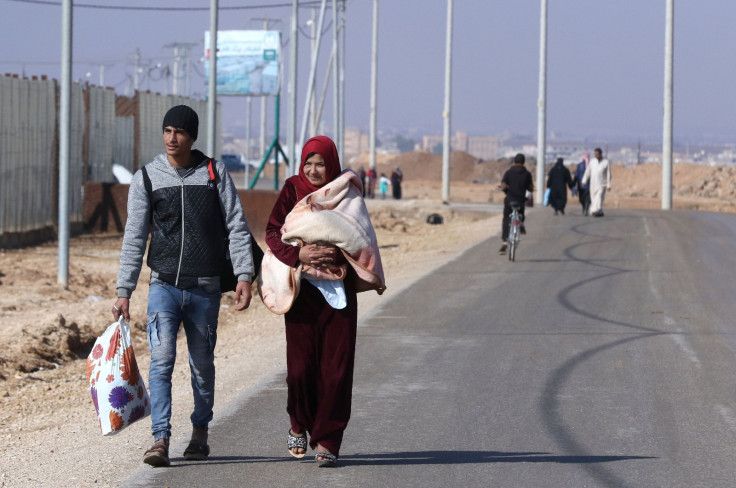Syrian refugees want to work – it is time Europe made it easier for them to do so
The EU should incentivise companies that help refugees work in countries like Jordan.
Last week President Trump signed an executive order suspending refugee resettlement to the US and barring Syrian refugees from entering the US indefinitely. Meanwhile, ahead of elections in Europe the appetite to welcome refugees appears to be waning. The decision of the new US administration leaves a significant gap in global provision for refugees, and makes not just more but better aid more important than ever for the developing countries that host the majority of them.
One year ago, the UK government commendably convened heads of state in London for a Syria donor conference. Participants pledged $12bn (£9.6bn) in funding for Syria's neighbouring countries by 2020 and agreed to create one million jobs for refugees, to reduce their dependency on aid and give them a chance to start rebuilding their futures.
The conference also introduced a new, potentially game-changing model of support for refugees in the form of the Jordan Compact: Jordan gets global investment and increased access to the EU market, to stimulate economic development, while refugees in Jordan are better supported to find jobs.
This approach has the potential to bring real improvements in the lives of refugees, however it should not be seen as a substitute for donor countries meeting their obligations to host refugees within their own borders. Jordan's contribution on this front needs real recognition: it hosts 87.45 refugees per 1000 inhabitants; the UK equivalent is just 1.9 per 1000.
One year on from the conference, as the Syrian conflict enters its seventh year, meaningful progress against the Jordan Compact has been made but it has been slow and uneven. EU trade concessions have been put in place but they are not yet being taken advantage of due to other barriers in the Jordanian economy; only three firms have applied to export to the European market. Some progress has been made on work permits – 37,000 work permits have been issued to Syrian refugees – but this falls short of the total 50,000 promised and only four per cent of permits have gone to women.
As a result, it remains difficult for refugees to find work. Work permit fees have been waived for Syrians since April 2016 yet the process remains complicated and cumbersome – refugees report more than a dozen steps to obtain a permit. Refugees must also prove their legal residency which is impossible for many thousands of them.
For the lucky ones who do get permits, they must renew it after one year and can only work legally for one employer. Information about jobs is scarce. And working conditions remain poor: an International Labour Organisation survey found that Syrian refugees are more likely than Jordanians to perceive their work as dangerous, physically hard or stressful.
For those refugees who want to set up a business, this often remains impossible too. Syrians had been obliged to find a Jordanian business partner and a deposit of more than $70,000, a prohibitive requirement given refugees' very limited access to capital. The paperwork is complicated and access to credit information is lacking. To register you need a passport, but many lost their documentation when they fled Syria.

And yet jobs are one thing refugees want and need above almost all else. This is why many end up taking informal jobs despite the risks. Ahmed, a father of five who fled the war in Syria for Jordan, took a job in a vegetable store to make ends meet for his family. He was unable to access an official work permit because of the costs. He was then caught by the police, who threatened him with deportation back to Syria unless he left the store immediately. Now without an income, his family struggles to survive.
No-one is pretending that creating jobs for refugees in Jordan is easy. Even before Syrian refugees started arriving in 2011, the unemployment rate in Jordan was 14 per cent, more than twice what it is in the UK today. Economic growth was slow and there's a shortage of foreign investment.
But better progress towards improving the lives and livelihoods of refugees and Jordanians through the Jordan Compact is possible. The International Rescue Committee has launched a report to assess progress against the Compact, to recommend improvements to its design and management, and to clarify priorities for driving forward its success in 2017.
We suggest introducing a business booster package, including cash grants, to stimulate the creation of new businesses and the growth of existing businesses. We propose a protection guarantee to uphold the rights of Syrian workers.
We suggest rewarding Jordanian businesses that meet the target of employing refugees as 15 per cent of their workforce by the end the year with EU trade access. We ask that the number of work permits for women increases from four per cent to 15 per cent. We recommend subsidised transportation and childcare to ensure that refugees can afford to take the jobs that do exist, as well as jobs that are set to become available in manufacturing zones far outside of major cities.
The Trump administration's early moves have just made global refugee management more difficult. Now more than ever we need innovation and action to ensure that refugees can get a better life in the countries that continue to host them. Getting refugees working and earning an income is critical. Innovations like the Jordan Compact provide exactly that opportunity.
Dr Radha Rajkotia leads the International Rescue Committee's economic unit and has worked in the refugee sector for twenty years. Follow @Radharajkotiz https://twitter.com/radharajkotia
© Copyright IBTimes 2025. All rights reserved.






















